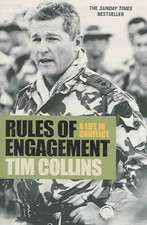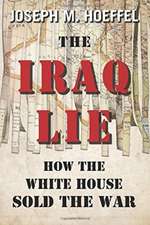Hope Is Not a Plan: The War in Iraq from Inside the Green Zone: Praeger Security International
Autor Thomas Mowleen Limba Engleză Hardback – 29 mar 2007 – vârsta până la 17 ani
Din seria Praeger Security International
- 18%
 Preț: 334.19 lei
Preț: 334.19 lei - 8%
 Preț: 335.53 lei
Preț: 335.53 lei - 34%
 Preț: 376.10 lei
Preț: 376.10 lei - 46%
 Preț: 443.64 lei
Preț: 443.64 lei - 29%
 Preț: 240.11 lei
Preț: 240.11 lei - 8%
 Preț: 304.56 lei
Preț: 304.56 lei - 34%
 Preț: 373.82 lei
Preț: 373.82 lei - 19%
 Preț: 412.79 lei
Preț: 412.79 lei - 19%
 Preț: 338.42 lei
Preț: 338.42 lei - 18%
 Preț: 335.62 lei
Preț: 335.62 lei - 27%
 Preț: 377.35 lei
Preț: 377.35 lei - 27%
 Preț: 376.75 lei
Preț: 376.75 lei - 18%
 Preț: 336.46 lei
Preț: 336.46 lei - 18%
 Preț: 321.73 lei
Preț: 321.73 lei - 27%
 Preț: 384.51 lei
Preț: 384.51 lei - 18%
 Preț: 320.50 lei
Preț: 320.50 lei - 18%
 Preț: 321.35 lei
Preț: 321.35 lei - 24%
 Preț: 420.54 lei
Preț: 420.54 lei - 14%
 Preț: 335.99 lei
Preț: 335.99 lei - 18%
 Preț: 355.82 lei
Preț: 355.82 lei - 18%
 Preț: 319.83 lei
Preț: 319.83 lei - 18%
 Preț: 334.28 lei
Preț: 334.28 lei - 32%
 Preț: 354.48 lei
Preț: 354.48 lei - 14%
 Preț: 335.14 lei
Preț: 335.14 lei - 38%
 Preț: 405.98 lei
Preț: 405.98 lei - 40%
 Preț: 571.34 lei
Preț: 571.34 lei - 18%
 Preț: 321.85 lei
Preț: 321.85 lei - 18%
 Preț: 323.25 lei
Preț: 323.25 lei - 18%
 Preț: 253.28 lei
Preț: 253.28 lei - 40%
 Preț: 571.50 lei
Preț: 571.50 lei - 14%
 Preț: 333.72 lei
Preț: 333.72 lei - 18%
 Preț: 301.73 lei
Preț: 301.73 lei - 19%
 Preț: 352.96 lei
Preț: 352.96 lei - 26%
 Preț: 387.80 lei
Preț: 387.80 lei - 18%
 Preț: 302.77 lei
Preț: 302.77 lei - 14%
 Preț: 333.91 lei
Preț: 333.91 lei - 17%
 Preț: 325.80 lei
Preț: 325.80 lei - 24%
 Preț: 338.58 lei
Preț: 338.58 lei - 34%
 Preț: 414.73 lei
Preț: 414.73 lei - 18%
 Preț: 354.30 lei
Preț: 354.30 lei - 29%
 Preț: 254.29 lei
Preț: 254.29 lei - 18%
 Preț: 354.11 lei
Preț: 354.11 lei - 18%
 Preț: 334.38 lei
Preț: 334.38 lei - 14%
 Preț: 302.68 lei
Preț: 302.68 lei - 18%
 Preț: 322.97 lei
Preț: 322.97 lei - 27%
 Preț: 376.50 lei
Preț: 376.50 lei - 27%
 Preț: 322.81 lei
Preț: 322.81 lei - 27%
 Preț: 382.91 lei
Preț: 382.91 lei - 18%
 Preț: 320.87 lei
Preț: 320.87 lei
Preț: 320.50 lei
Preț vechi: 391.49 lei
-18% Nou
Puncte Express: 481
Preț estimativ în valută:
61.33€ • 64.03$ • 50.76£
61.33€ • 64.03$ • 50.76£
Carte tipărită la comandă
Livrare economică 04-18 aprilie
Preluare comenzi: 021 569.72.76
Specificații
ISBN-13: 9780275994457
ISBN-10: 0275994457
Pagini: 192
Dimensiuni: 156 x 235 x 25 mm
Greutate: 0.45 kg
Editura: Bloomsbury Publishing
Colecția Praeger
Seria Praeger Security International
Locul publicării:New York, United States
ISBN-10: 0275994457
Pagini: 192
Dimensiuni: 156 x 235 x 25 mm
Greutate: 0.45 kg
Editura: Bloomsbury Publishing
Colecția Praeger
Seria Praeger Security International
Locul publicării:New York, United States
Notă biografică
Thomas Mowle is associate professor of political science at the United States Air Force Academy. He received his PhD from the Ohio State University. His research focuses on Iraq, transatlantic relations, and foreign policy decision making. He has published Allies at Odds: The United States and the European Union (2004), as well as articles in International Studies Perspectives, Political Psychology, Strategic Insights, and Disarmament, and chapters in books on Iraq, Bosnia, Turkish foreign policy, and U.S. arms control policy. He served in the Strategy, Plans, and Assessment Division, Headquarters Multinational Force-Iraq, Baghdad, from August to December 2004.
Recenzii
With thousands of deaths and hundreds of billions of dollars spent, the indisputable fact remains that the Iraq war is a major failure. But what led to such a negative outcome? In this highly informative volume edited by Mowle, contributors provide first-hand accounts and experiences from their tours of duty in the Green Zone, where most policies were adopted and implemented. From the facts, insights, and analysis provided, it is clear that there was a lack of robust strategy, preparation, communication, coordination, and understanding of the local cultures, the nature of the resistance, and the local politics in Iraq by coalition forces. Neither the civilian nor the military agencies were prepared structurally and culturally to manage a multi-agency stability and development operation of tremendous complexity, under conditions of continuing violence that created difficulty assessing progress. Furthermore, each agency often pursued mutually exclusive and even contradictory objectives. Military actions undermined political goals, which led to the growing sense of popular frustration and despair among the Iraqi population. Highly recommended. All readership levels
[T]hese authors provide a sobering analysis from their vantage point as military officers. . . . [T]he authors wrote the book not because they thought that could save the situation in Iraq, but rather because they hoped that lessons learned could be applied to future post-conflict situations. . . . [T]he real payoff for this book is the systematic effort to document the lack of coordination across agencies and the coalition. Of greatest concern to the authors is the lack of an entity that can provide overall direction in situations that require military operations, political direction, and economic expertise. . . . Militaries know how to fight and win wars. Diplomats know how to foster dialogue. But who in the United States has the proper training for post-conflict reconstruction? The authors argue we better figure that out quickly.
Written entirely by individuals who served between mid-2004 and mid-2005 at Headquarters, Multinational Force Iraq, in Baghdad's Green Zone, the eight chapters of this volume document the failures of the American occupation of Iraq..The text focuses on the period of the existence of the Iraqi Interim Government, from the June 2004 handover of sovereignty to the selection of the Iraqi Transitional Government in May 2005 and contains chapters that discuss political failures of planning, occupational authority attempts to develop intelligence, the work of training the Iraqi Security Forces, the role of elections in bringing about a government that occupation forces hoped would be seen as legitimate by Iraqis, and the lack of strategic thinking concerning the opportunities opened up by elections and the new government.
[T]hese authors provide a sobering analysis from their vantage point as military officers. . . . [T]he authors wrote the book not because they thought that could save the situation in Iraq, but rather because they hoped that lessons learned could be applied to future post-conflict situations. . . . [T]he real payoff for this book is the systematic effort to document the lack of coordination across agencies and the coalition. Of greatest concern to the authors is the lack of an entity that can provide overall direction in situations that require military operations, political direction, and economic expertise. . . . Militaries know how to fight and win wars. Diplomats know how to foster dialogue. But who in the United States has the proper training for post-conflict reconstruction? The authors argue we better figure that out quickly.
Written entirely by individuals who served between mid-2004 and mid-2005 at Headquarters, Multinational Force Iraq, in Baghdad's Green Zone, the eight chapters of this volume document the failures of the American occupation of Iraq..The text focuses on the period of the existence of the Iraqi Interim Government, from the June 2004 handover of sovereignty to the selection of the Iraqi Transitional Government in May 2005 and contains chapters that discuss political failures of planning, occupational authority attempts to develop intelligence, the work of training the Iraqi Security Forces, the role of elections in bringing about a government that occupation forces hoped would be seen as legitimate by Iraqis, and the lack of strategic thinking concerning the opportunities opened up by elections and the new government.











